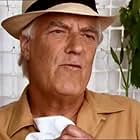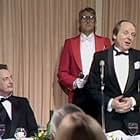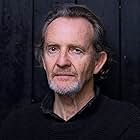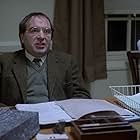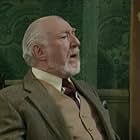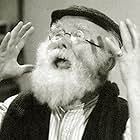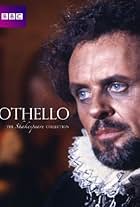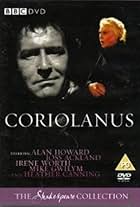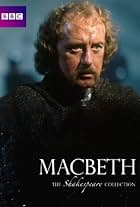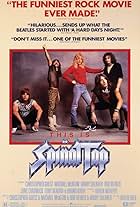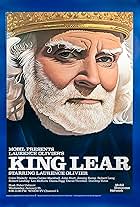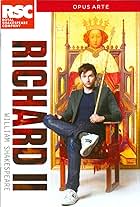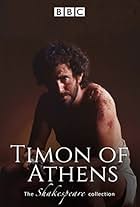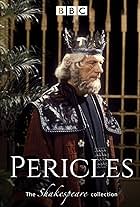This is a caustic, disturbing production by Jonathan Miller that belies the usual condemnation of BBC blandness.
Colors are deliberately desaturated, costumes are all black, interior sets have a plank-and-drape design and a Velasquez-like austerity, exteriors have little or no detail, and scenes are played out in long, tight shots that emphasize the intimacy of television vs. the distance of stage. The taping was in a much smaller studio than usual, as the big room at the BBC was being used for "Richard III" at the time. The overall impression is discomfort, deliberately.
Robert Shaw was cast as Lear, but he suddenly dropped dead at the age of 51 just before taping. It would have been something to see a certifiably mad actor play a mad king. However....
Michael Hordern has a film reputation as a doddering, comic blitherer, but in the classics he had far more range and authority, and we get to see much of it here. He is always the king, and genuinely moving in his recognition scene with Cordelia.
In addition to Hordern, many in the cast had worked with director Jonathan Miller on previous telecasts. John Bird from "Shrew" and "Timon" is here largely free of his usual comic mannerisms. Anton Lesser, good in "Troilus," is a little small as Edgar, but then so is Michael Kitchen as Edmund. Norman Rodway, excellent in "Timon," is no less so here as Gloucester. Penelope Wilton, an equivocal Desdemona, is much better here as Regan. Gillian Barge's Goneril and John Shrapnel's Kent should also be complimented. I must say Frank Middlemass's Fool eludes me. I find him too old, too solid and not always intelligible - a spirit of earth, not of air.
Jonathan Miller stated that a director's role was to react against a familiar play, not merely be a servant to it. "Lear" is by far the most subversive in his Shakespeare collection. This result is not through inexperience. Miller had directed the play on stage with Hordern and Middlemass in 1969 and for the BBC in 1975 (supposedly better, but we'll never see it). So we can assume that this 1982 production is pretty much what he wanted.
Much of the show winds up more a comment on "Lear" rather than a straightforward performance. Miller's neurology background makes the mad scenes medically grounded and often nerve-wracking. Edgar's Tom o' Bedlam scene approaches the unsettling chaos of "Marat/Sade," and crazy Lear's meeting with blind Gloucester turns into vaudeville according to Samuel Beckett.
Such treatment doesn't betray the play, but if you're looking for comfortable, pipe-and-slippers Shakespeare, this isn't the one.
If you are at all prone to rumination, this is the one that will lead you into questions about Job, the absence/silence of God, why bad things happen to good people, etc. Surely Lear shouldn't have asked that stupid question, but why is there so much collateral damage? This production is not just a drama, it's an invitation to thought, and that's always dangerous.
The greatest personification of the title role on video remains Orson Welles, in a prized relic from the Stone Age of live television. The Olivier version, with a starrier cast, a shooting schedule three times longer and a budget five times bigger than Hordern/Miller, will be the obvious choice for many. But there is much to stimulate here, for those who dare.



